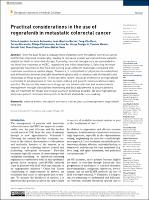| dc.contributor | Vall d'Hebron Barcelona Hospital Campus |
| dc.contributor.author | Antonuzzo, Lorenzo |
| dc.contributor.author | Bachet, Jean-Baptiste |
| dc.contributor.author | Kuan, Feng-Che |
| dc.contributor.author | Macarulla Mercadé, Teresa |
| dc.contributor.author | Loupakis, Fotios |
| dc.contributor.author | Pietrantonio, Filippo |
| dc.date.accessioned | 2021-11-10T11:04:37Z |
| dc.date.available | 2021-11-10T11:04:37Z |
| dc.date.issued | 2020-10-31 |
| dc.identifier.citation | Loupakis F, Antonuzzo L, Bachet JB, Kuan FC, Macarulla T, Pietrantonio F, et al. Practical considerations in the use of regorafenib in metastatic colorectal cancer. Ther Adv Med Oncol. 2020 Oct 31;12:1–12. |
| dc.identifier.issn | 1758-8359 |
| dc.identifier.uri | https://hdl.handle.net/11351/6519 |
| dc.description | Adverse events; Metastatic colorectal cancer; Regorafenib |
| dc.description.abstract | Over the past 20 years, management of patients with metastatic colorectal cancer (mCRC) has improved considerably, leading to increased overall survival and more patients eligible for third- or later-line therapy. Currently, two oral therapies are recommended in the third-line treatment of mCRC, regorafenib and trifluridine/tipiracil. Selecting the most appropriate treatment in the third-line setting poses different challenges compared with treatment selection at earlier stages. Therefore, it is important for physicians to understand and differentiate between available treatment options and to communicate the benefits and challenges of these to patients. In this narrative review, practical information on regorafenib is provided to aid physicians in their decision-making and patient communications in daily practice. We discuss the importance of appropriate patient selection and adverse events management through close patient monitoring and dose adjustments to ensure patients stay on treatment for longer and receive as much benefit as possible. We also highlight key physician–patient communication points to facilitate shared decision-making. |
| dc.language.iso | eng |
| dc.publisher | SAGE Publications |
| dc.relation.ispartofseries | Therapeutic Advances in Medical Oncology;12 |
| dc.rights | Attribution-NonCommercial 4.0 International |
| dc.rights.uri | http://creativecommons.org/licenses/by-nc/4.0/ |
| dc.source | Scientia |
| dc.subject | Còlon - Càncer - Tractament |
| dc.subject | Recte - Càncer - Tractament |
| dc.subject | Proteïnes quinases - Inhibidors - Ús terapèutic |
| dc.subject.mesh | Colorectal Neoplasms |
| dc.subject.mesh | Protein-Tyrosine Kinases |
| dc.subject.mesh | /antagonists & inhibitors |
| dc.subject.mesh | Clinical Decision-Making |
| dc.title | Practical considerations in the use of regorafenib in metastatic colorectal cancer |
| dc.type | info:eu-repo/semantics/article |
| dc.identifier.doi | 10.1177/1758835920956862 |
| dc.subject.decs | neoplasias colorrectales |
| dc.subject.decs | proteína-tirosina cinasas |
| dc.subject.decs | /antagonistas & inhibidores |
| dc.subject.decs | toma de decisiones clínicas |
| dc.relation.publishversion | https://doi.org/10.1177/1758835920956862 |
| dc.type.version | info:eu-repo/semantics/publishedVersion |
| dc.audience | Professionals |
| dc.contributor.organismes | Institut Català de la Salut |
| dc.contributor.authoraffiliation | [Loupakis F] Unit of Oncology 1, Department of Clinical and Experimental Oncology, Istituto Oncologico Veneto, IRCCS, Padua, Italy. [Antonuzzo L] Medical Oncology Unit, Azienda Ospedaliero Universitaria Careggi, Florence, Italy. [Bachet JB] Sorbonne Université, Service d’hépato-gastroentérologie, Hôpital Pitié Salpêtrière – Paris 6, APHP, Paris, France. [Kuan FC] Department of Hematology and Oncology, Chang-Gung Memorial Hospital, Chiayi, Taiwan. [Macarulla T] Servei d’Oncologia Mèdica, Vall d’Hebron Hospital Universitari, Barcelona, Spain. [Pietrantonio F] Medical Oncology Department, Fondazione IRCCS Istituto Nazionale dei Tumori, Milan, Italy. Department of Oncology and Hemato-oncology, University of Milan, Milan, Italy |
| dc.identifier.pmid | 33193826 |
| dc.identifier.wos | 000587954500001 |
| dc.rights.accessrights | info:eu-repo/semantics/openAccess |

